- Home
- Cecil Beaton
The Years Between (1939-44) Page 3
The Years Between (1939-44) Read online
Page 3
There and then Harrison Ainsworth, Compton Mackenzie and the Brontës were devoured ravenously in my bed by the light of a candle placed in a biscuit tin. But when there was anyone else present in my room it was hard for me to concentrate. I remember Jack came one afternoon to lie and read in a wicker chair. His presence prevented me from paying attention to W. J. Locke, and after listening to the creak of the wicker and the flutter of his pages being turned, I became self-conscious and began to giggle. Even now it is hard for me to read while others are present, and impossible if they are talking to one another.
On this boat trip I have read most of the time. But my powers of concentration are dreadfully undisciplined: a name or sentence, on a page, can throw me off into vistas of day dreaming. So it happened, when reading E. M. Forster’s Howard’s End, I came across the description of Leonard’s wife, the old tart who was down on her luck. In a flash I found myself remembering a scene that had made such an impression upon me as a small boy but which, during all these years, I had forgotten.
It was a Sunday evening one summer. My family had been on the river. It was when the river was still quite fashionable, and it gave me a tremendous thrill to be at Boulter’s Lock or Marlow where actresses of the day were photographed in a punt or sitting at a table under Dorothy Perkins rambler roses on a sloping lawn. We had had a family picnic. Somehow our picnics were always rather a disappointment. I wanted to be ‘smart’. The rest of the family had no thought of such a thing; they just wanted to be themselves and enjoy the day naturally. I pined to go to Phyllis Court, or the club at Henley where my spectacular Aunt Jessie had once taken me for strawberries and cream. My father, in particular, asked nothing more than an outing on the river that should cost as little as possible. So with rugs, macintoshes (just in case), and a luncheon basket, we set off in the punt, my father showing prowess with the pole. (He had been a great figure on the river in his youth.) The dank river-smell always had a certain mysteriousness to it, and the hamper contained the hard-boiled eggs which, with their green poison-looking yolks, were always an event. But the sandwiches were a comedown — obviously made from the remains of the Sunday family joint, grey bits of beef were placed between squares of gritty, white, crustless bread. Somehow we could never find the ideal place for our alfresco meal.
Invariably a few large drops of rain would presage a downfall. We would shelter beneath some inadequate twiggery. Soon, with soaked spirits and overcoats, my father punted us back to our starting-off post. Here we would wait impatiently the longed-for return of the chauffeur and the old Renault to take us, worn out, cold and exasperated, home.
It was while sitting, after the rainstorm, on the lawns of the ‘boat hire’ place that I remember seeing a wretched woman whom, now I have read Howard’s End, I shall never again forget. She was waiting near us, in a bentwood chair on the lawn. She must have been quite elderly, for she had tired old dog eyes and knotty-veined legs and neck, though to a child anyone showing a crow’s-foot or veined neck seems to be monumentally aged. But this lady wore finery that, in intention, was extremely youthful, and it had doubtless been brought out, from old forgotten boxes and attic parcels. She wore, without having ironed it, a dress of string-coloured lace, champagne shoes of cracked kid, and a battered picture hat jammed low over beef-tea dyed hair. She sat with a brandy and soda in her gnarled hand, and I knew from the way that my parents whispered about her that she was wicked — that, in fact, this travesty, dressed in the pretence of youthful coquetry, was the embodiment of vice.
The wretched old bird and a boy friend had been out for a day on the river. When they returned here, her friend had probably left her to go to the wash-room; at any rate he had failed to return. So she waited patiently: she had ordered a drink, and still he had not reappeared.
I remember daddy saying, sotto voce, to mummie, ‘Well, he might at least have taken her back to London.’ By now she was slightly tight, and for good reason. Here she was at Marlow, Sunday evening, stranded, ‘stood up’.
I could not have been more than nine years old, though I may have been less, and for me, this scene was appalling in its poignancy. Also, it brought to the surface many of one’s hidden childish horrors. Here was a woman left to get home without an overcoat, without a ticket, without money, and, what was worse, she was obviously wicked: as a child, one heard one’s elders making jokes about drink and sin being synonymous, and here she was, drinking brandy and soda all by herself. I recognized the poor old thing as a ‘bad lot’, and my mind worked feverishly imagining what could be the sin she committed. By degrees, she became the embodiment of such appalling evil that, today as an adult, I am shocked that a child, in its ignorance, can, in its mind, evoke Kraft Ebbing scenes and practices that only exist in the most elaborate and depraved Berlin brothels.
So, since twenty-five years ago, this wretch has been waiting for the beau who welched. Why had her day been such a failure? Had the two of them bickered when the rain came down? Had she plied her girlish wiles too relentlessly? Had the shock of seeing a phantom of the night in broad daylight been too upsetting?
Perhaps she realized the humour of the situation, if indeed there was any, for she looked over at our domesticated family group and smiled. Like an old dog that has snapped at a fly and caught it, she winked at me. My parents were rather discomforted. We were bundled together and hurried out of the presence of sin.
NEW YORK AND BACK
White-faced and swollen-eyed, Margaret Case, a great anglophile and one of my first, and certainly one of my most loyal of all New York cronies, was at the docks to greet me. She had a sheaf of newspapers under her arm, and asked if I had read the news? Three hundred and thirty thousand troops had landed safely from the exodus from Dunkirk. It was a miracle, she said, that the whole British Army had not been wiped out. I was too numb and uninformed on the latest developments to understand that a retreat on such a huge scale could be considered anything but disaster. But, by painful degrees, I learnt the full horror of all that had been happening during the past week while we were at sea.
Yes, my visit to the United States was profitable: I took a series of advertisement photographs — which seemed to me in odd contrast to the times — in which society ladies must appear as if they possessed complexions of finest alabaster. If my spirit was not entirely with the undertaking I was able to call upon the technique I had developed during the years. The advertisers and the ladies were both delighted, and the addition to my bank balance helped the financial stalemate which continued until the end of the war.
However, these weeks, spent living in unaccustomed luxury in the Fifth Avenue palace of a beautiful and kind friend, were made into a nightmare of anguish and horror by the progressively deteriorating events in Europe.
Each morning I woke, heavy from a semi-sleepless night, to find the newspapers folded beside my breakfast tray on the pink crepe de Chine sheets of my large bed. The banner headlines blared forth the news of the fall of France, and of the refugees from the appalling onrush of Panzer divisions: every hour the radio bulletins told of further tragedy. Nowhere could one find solace from the prevalent gloom. One’s worst fears were confirmed each hour by friend and news bulletin.
When I was free to return home, my good, but misguided, friends begged me to remain with them for, at any rate, a few days. They said: ‘England will probably be invaded any day now — and there can’t be much resistance. Why not stay here a few more weeks, and then it may all be over. In any case, what are you going back to?’
But terrible as the prospect might be, I was impatient to return to where I knew I belonged.
My American friends have never shown more sincere devotion, or more loyalty to the Allied cause, but New York has a very large German population. As the liner was sailing down to the ocean for our return across the Atlantic a pleasure steamer that tours sightseers around New York, manned by a German crew, came across our bows, and as it passed close by, its crew grinned with macabre grimaces as it jabbed it
s thumbs down at us.
Back again — after an eventless journey on a half-empty ship — in my servantless, small house in Wiltshire, my spirits soared. The war situation had in no way improved: any day now an invasion by the Germans could be expected: the future might well be gruesome, but, somehow, to be in the midst of this maelstrom was far less painful than to hear of it from afar. I was positively amazed and comforted when my Aunt Jessie, pottering in bedroom slippers in the greenhouse, with a broad smile on her shiny cold-creamed face, said, ‘Do you know, those dashed Germans dropped a bomb only a few miles from here? What were they up to? Scared a lot of rabbits, but what good could it do? Just blasted cheek!’
Part III: Air Raids, 1940
IRENE VANBRUGH AND A SHORT PLAY PROJECT
Summer 1940, 8 Pelham Place, London
It was a new adventure for me to call upon a renowned actress to discuss, as author, the play in which she is to appear. The fact that I, with John Sutro, was only part author, and that the play was but a short twenty-minute affair, did not detract from the magnitude of my visit.
I was shown, with the script under my arm, into a room filled with theatrical photographs and paintings, and any old vases of flowers, real and artificial. Irene Vanbrugh was waiting over the teacups. The years have made her increasingly like her sister, Violet: square-faced and gaunt. But, in spite of the physical disabilities which are the scourge of old age — the twisted rheumaticy wrist and bent fingers, huge ox-tongue feet, deepset sunk eyelids and false teeth — I had soon yielded to her attack of personality and became a victim of her charm.
The tea and brown bread and butter were disregarded as Miss Vanbrugh told me she liked my quarter-playlet. She wanted to take on the part at once. A few minor changes should be made but, as she explained, this was customary: if the author is unknown he is likely to be more willing to make alterations from the suggestions of others; it is only the old hack who knows his job too well to learn and to permit even a word to be altered. We went through the play line by line. She was completely forthright and took it for granted that others would be as business-like as she. Each typewritten speech came to a vivid life with Irene Vanbrugh presiding over it. She became a sort of microscope through which one could see all the faults and qualities of the written words. I felt nearer to the play than I had before while creating it with John. I was encouraged that so much was there that could be effective.
The professional’s skill was also shown in deleting little bits of business which, she assured me, would be unsuccessful across the footlights: the leading lady must not leave the stage for even a second during this short play; the audience would always be conscious of that revolver she was holding; while it was in her hand she must not reminisce about Austria or talk of scones. Besides, it was, at this juncture of the playlet, too late even to mention Austria and scones. ‘You have already registered the atmosphere and you must not plug it too long. Coquelin used to tell me that when playing Cyrano’s death scene he no longer wore a large nose. It would merely have got in the way of his performance, and the audience did not miss it for they had long ago established the fact that he had a big nose.’
‘Theatre’ is created by these effects which can be learnt by experience. How fascinating a medium! I do hope one day to master its intricacies.
When, at length, I left Miss Vanbrugh I was even more her admirer than before. Only now did I realize how much the effect she creates on the stage (and even off) is the direct result of a quick brain at work experimenting and using intelligently her long experience.
The blitzkrieg started. Theatres closed in the provinces as well as in London, and John’s and my playlet has yet to be taken out of a forgotten drawer.
August 16th, Ashcombe
Only a few minutes after the 5 o’clock to Salisbury had left Waterloo the air raid sirens sounded. Then the guard, a little man of over fifty years, came along the corridor crying ‘All blinds down.’ Above the noise of the train we heard thumps and bangs. We went on with our reading or minding our own business with lowered eyelids. The English behave with impassivity even in the face of disaster. Imagine this carriage filled with Latins! The screams! The hysterics! Our train came to a halt while, still silent, we sat in a shuttered carriage and just waited. Then, somewhat grudgingly, the train continued. Contrary to the rules, we peered through the blinds and saw that a bomb had started a fire: from a small house a huge black plume of smoke curled into the sky. The general gravelike quietness was extraordinary. Still no one spoke. We heard more thumps. Our train once more came to a halt, as did another shunting slowly towards us. It was empty — its passengers having disgorged themselves fifty yards down the line. All its windows were broken. Eventually, we moved into the station of Malden, and I remembered that at St Cyprian’s, my preparatory school, there was a boy called Reggie Malden who was small, pudgy, with pale suet complexion and protruding teeth; he was a lord. Today, Malden Station was a nasty untidy mess, its glass roof blown to smithereens, the general waiting-room a shambles. The local ARP in tin helmets were busy with lorries, bicycles, motor-cycles. We had not realized that we were in the centre of a raid, that we had missed a bomb by fifty yards and by half a minute or less.
The ‘All Clear’ sounded. The women and children burrowing in their shelters surfaced again, laughingly jerked up their thumbs, and waved. We all trooped on to the line to inspect the damage: the usual story of walls blown away, of cement dust, crumbled bricks, and bomb craters among the runner beans and rambler roses of the cottage gardens.
When later we were on our way to Salisbury again, the damage all along the line was already being cleared up, and the craters in the open fields were quickly being filled before cows could fall in and break their legs. The guard of our train became emotional when the crisis was over. Waving victoriously out of the windows at the women and children clustered together, rejoicing in their safety, he ad libbed, ‘Those women have had a lot to put up with... It’s a hell of a strain for them with the responsibility of all their children to look after...’
On the somewhat halting journey (because of delayed action bombs, our train was diverted to Southampton, where another raid was in progress) miscellaneous snippets of information were picked up. Nine people had been killed at Basingstoke. Overton had got it badly.
Four hours late we arrived at Salisbury at 11 o’clock at night. While a friend gave me a lift to Wilton, friendly voices stopped us, ‘Lower your lights, there’s an air raid warning.’ The blitz seemed to be everywhere. The local yokel who had charge of my car had gone to bed and refused to let me get it from his garage. The night was spent at neighbouring Juliet’s,[9] who, like everyone else, enjoys her own personal bomb story, and remains incorrigibly gay. ‘Fire bombs in the park!’ She raised her eyebrows. ‘What a whimsey!’
BOMB DAMAGE AT CROYDON
Pelham Place
Went to Croydon to see real air raid damage. It is pathetic! The sirens didn’t go off and 300 women and girls were killed in factories there. The relics are poignant: a picture of the King and royal family among the cardboard containers that lie by the thousand among the white cocaine-like debris! A residential quarter also suffered, and one dwelling — luckily deserted — was completely demolished, its art nouveau decorations scattered far and wide. ‘If you go there you’ll find an unexploded bomb — maybe a dud — maybe a delayed action. Better keep this side of the fence.’ Along one road, where a stick of bombs dropped, they’ve made a guy of Hitler, railed off a section and collected scrap iron — twelve and a half tons of it! In Germany everything is done by order. Here much is left to personal spontaneous effort.
The funeral processions pass down the highway; everyone is calm and quiet. But one street beyond, life goes on as if nothing had happened, as if nothing could happen from one particular day to another — unless of course our number is called and, if it is, we are not likely to know it, luckily.
I dined with Sybil Colefax — her usual ‘ordinary’: when everyone
present pays his share. Diana was there, and Knickerbocker, the American journalist, an interesting, Lawrencelike Major Wingate with a Chinese-doll wife, the Minister of Agriculture, etc. As the raid was above us and we could not move, the evening was a success for the hostess. Wingate fascinating, a dynamo, but over life-size and, as the night wore on, the rest of us smothered yawns. When at last we did leave, the sky presented such a spectacle that again we were prevented from going to bed. The heavens, sparkling with every star in the constellation, were patterned with nearly half a hundred searchlights. Occasionally coloured flares were dropped, but these seemed to die after a short descent.
BOMBS ON LONDON
August 30th, 1940
The air so clean, the sun so pristine in its sparkle; only the dried trees and biscuit-coloured grass betrayed that summer was passing. It was more like a spring day in Italy than late August in London. I went down to the city to photograph the damage done by Sunday night’s raid. When I found myself at St Giles’s church the sirens again went. Everyone ran for shelter. It was as if a squall had suddenly sprung up and everyone sought cover from the raindrops.
The sun slanted through the broken stained-glass windows making it a pleasant place in which to seek protection. I marvelled at the freaks of air raid damage and the unfathomable laws of blast. Scattered cherubs’ wings and stone roses were strewn about — whole memorial plaques of carved marble had been blown across the width of the church and lay undamaged. The entire frontage of the deserted business premises opposite was wrecked, and Milton’s statue had been flung from its plinth. Yet the lamp-post was standing erect with no pane of its lantern broken. A cluster of workmen, shielded by a few wooden planks, were making jokes as they gazed into the turquoise sky.

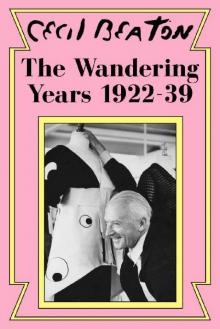 The Wandering Years (1922-39)
The Wandering Years (1922-39)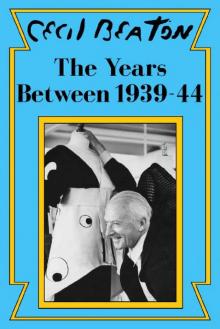 The Years Between (1939-44)
The Years Between (1939-44)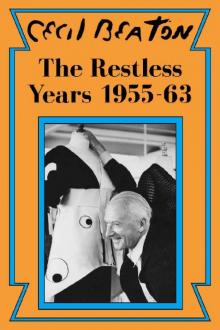 The Restless Years (1955-63)
The Restless Years (1955-63)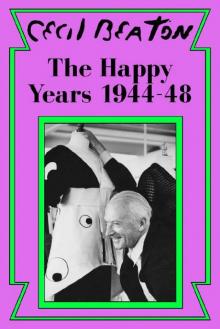 The Happy Years (1944-48)
The Happy Years (1944-48)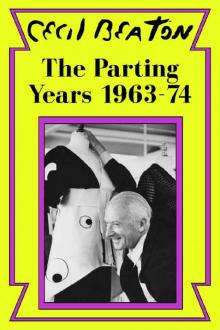 The Parting Years (1963-74)
The Parting Years (1963-74)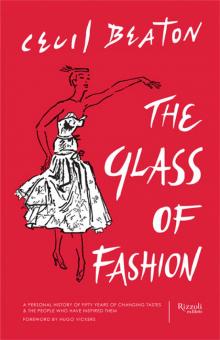 The Glass of Fashion
The Glass of Fashion